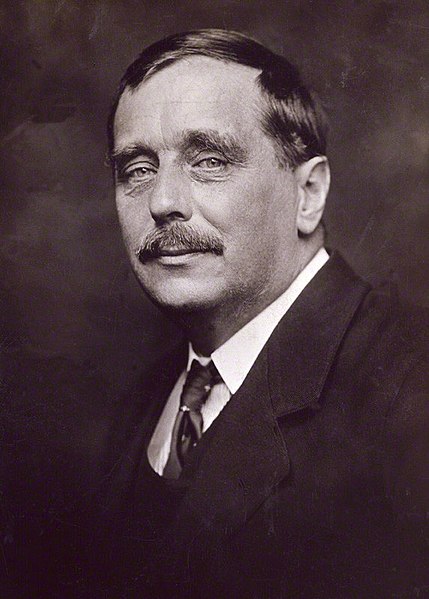 |
| H.G. Wells, 1920 George Charles Beresford / Public domain via Wikimedia |
H. G. Wells was born in 1866 in England and he became a prolific writer of fiction (predominantly science-fiction), non-fiction, short stories, biography and satire.
In his youth, he was an excellent scholar but he was born to a poor family who were unable to support themselves financially and so they demanded he neglected his education and enlisted him in a variety of apprenticeship schemes to supplement the family income.
From 1880 to 1883, Wells worked as a draper (cloth merchant) at Hyde's Drapery Emporium in Southsea, England. His time there was miserable, working 13-hour days, but in 1883, he persuaded his parents to let him take a student-teacher role that he had been offered at a local Grammar School.
The following year, Wells won a scholarship to the Normal School of Science where he trained under the great zoologist, T. H. Huxley, who was the inspiration for his science-fiction writing.
In his novels. Wells’ makes many predictions and while most of them have not come true (yet), there are some that have. In “Men Like Gods” (1923), Wells predicts a wireless system with properties similar to voicemail and email, and in “Visitors to The Island of Dr. Morea” (1896), he considers genetic engineering. We are still waiting to see if time travel, a martian invasion and the superpower of invisibility are to come!
Read why Sabrina considers H. G. Wells her hero:
H.G. Wells is my hero. He was a fantastic and very descriptive writer. His books have inspired me to write stories of my own. He wrote science-fiction novels, some non-fiction, and some short stories but it is his science fiction books that have inspired me the most.
Some of Wells' most famous books are "War of the Worlds" and "The Time Machine." He wrote many other books, such as "The World Set Free," "The Soul of a Bishop," "The Secret Places of the Heart" and many more. His fictional stories got many people interested in his ideas. He probably inspired many with his stories.
In one of his books, "War of the Worlds," H.G. Wells writes about Martians attacking Earth. When Mars cannot withhold the creatures living on it, the Martians invade Earth to make it their own. They die off because they eat blood. They were eating our blood and their bodies were not immune to our diseases. The book takes place in England, through the eyes of a scientist. It was published first in 1898. In 2005, a movie based on this book was made.
In another book, "The Time Machine," the main character builds a time machine. He built it for practical reasons. He traveled a little bit into the future and it seemed like paradise. He went further into the future and it seemed like the world was further apart. After awhile, he ended up in another paradise where there were natives living in their own little village. This book was first published in 1895 and was Wells' first successful science-fiction novel.
Wells was not only an author; he was also a sociologist, journalist and a historian. He was a historian because of his science-fiction novels. Some of his novels, like "The War of the Worlds," are still read today. His books made people interested in science and space. Back when he was alive, not many people believed in the sort of technology used in his books. The people who were alive then would probably be amazed at our technology now. Wells’ books were sort of like predictions.
Behind the books, H.G. Wells had his own life to worry about. His real name was Herbert George Wells. He was easily attracted to women, but his wife, Jane, held out and didn't leave him. She continued to take care of the kids and the house while he was out on dates, working on his books, or just away. When Wells was home, he was usually tired or sick.
When Jane died, it hurt Wells emotionally. One of the books he published after her death was "The Anatomy of Frustration!" It showed Wells' unhappiness. He had a hard life even with Jane alive. Although his life seemed easy, there was more behind the cover.
H.G. Wells was not a hero in ways you may think of a hero. He didn't have superpowers or save people. He was a hero in a different way. He encouraged people to read his books and look into our technology. He is my hero because his books and life gave me an interest in him. H.G. Wells is my hero.
Page created on 9/4/2011 12:00:00 AM
Last edited 8/3/2024 9:21:21 PM
